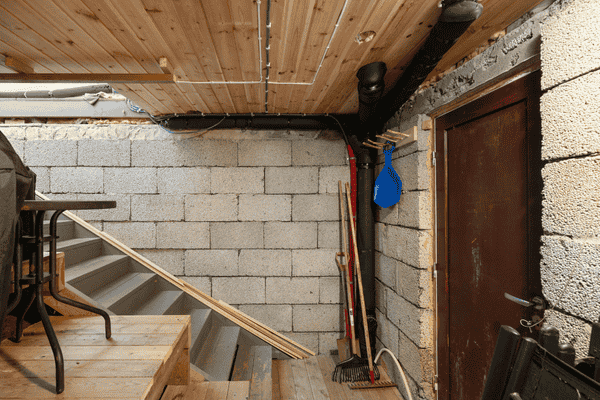Basement mould is a common problem that many homeowners in Red Deer, Alberta, and the surrounding areas face. Left unchecked, mould can spread rapidly, posing serious health risks and causing significant structural damage to your home. The damp and poorly ventilated conditions in basements create the perfect environment for mould growth, making it a persistent issue for homeowners.
At Rawk J Services, we understand the dangers of mould in your basement and the stress it can bring to homeowners. That’s why we’ve put together this comprehensive guide to help you identify, prevent, and eliminate mould before it becomes a bigger issue.
Why Is Mould Growing in Your Basement?
The Perfect Conditions for Mould Growth
Mould thrives in environments that are dark, humid, and poorly ventilated—conditions that basements often provide. When excess moisture meets organic materials like wood, drywall, or carpet, it creates an ideal breeding ground for mould spores.
Common Causes of Basement Moisture
Several factors contribute to excess moisture in your basement, increasing the likelihood of mould growth:
- Leaky Pipes: Small leaks from plumbing fixtures introduce constant moisture, creating the ideal conditions for mould.
- Foundation Cracks: Even minor cracks in your foundation can allow water to seep in, increasing humidity levels inside.
- Inadequate Insulation: Poor insulation leads to condensation buildup, contributing to long-term moisture problems.
- Flooding: Heavy rains, sewer backups, or burst pipes can introduce excess water, leading to widespread mould growth if not properly addressed.
- High Humidity Levels: Basements tend to have naturally high humidity, especially in the summer months, providing an ideal environment for mould spores to multiply.
Signs of Mould in Your Basement: What to Look For
Visual and Hidden Clues of a Mould Problem
Identifying mould early is key to stopping it before it spreads. Here are some indicators that you might have a mould issue:
- Black, green, or white spots: Mould often appears as discoloured patches on walls, ceilings, or floors.
- Warping surfaces: Mould can cause materials like drywall and wood to swell, buckle, or deteriorate.
- Peeling paint or wallpaper: Excess moisture behind walls can lead to bubbling or peeling finishes.
- Water stains: Discoloration on walls or ceilings can indicate a moisture problem that could lead to mould.
Smells and Health Symptoms You Shouldn’t Ignore
Sometimes mould is hidden behind walls, under carpets, or inside insulation, but it still makes its presence known through odours and health symptoms:
- Musty, damp odour: If your basement smells stale or earthy, you may have hidden mould growth.
- Respiratory issues: Exposure to mould spores can cause coughing, sneezing, or throat irritation.
- Worsening allergies or asthma: Individuals with sensitivities may experience aggravated symptoms.
- Fatigue, dizziness, or headaches: Prolonged exposure can lead to general discomfort and health concerns.
If you notice any of these signs, it’s essential to take action immediately to protect both your home and your health.
How to Stop Mould Before It Spreads
Improve Ventilation and Control Humidity
One of the most effective ways to prevent mould growth is to control humidity levels. Here’s how:
- Use a dehumidifier: A high-quality dehumidifier can help maintain indoor humidity below 50%.
- Improve air circulation: Use fans or open windows periodically to encourage fresh airflow.
- Install moisture barriers: Vapour barriers on walls and floors can help prevent moisture intrusion.
- Check and clean HVAC systems: Dust and moisture buildup in ducts can contribute to mould growth.
Fix Leaks and Waterproof Your Basement
Stopping moisture at the source is critical in mould prevention. Take these steps:
- Repair any leaky pipes to prevent slow water accumulation.
- Seal foundation cracks with professional-grade epoxy or sealant.
- Maintain proper drainage by ensuring gutters and downspouts direct water away from your home.
- Install a sump pump if your basement is prone to water intrusion.
Clean and Remove Existing Mould Safely
If mould is already present in your basement, it’s important to clean it properly:
- Use vinegar or hydrogen peroxide to remove small surface mould areas.
- Avoid harsh chemical cleaners like bleach, which can worsen airborne spores.
- Dispose of contaminated materials like drywall, insulation, or carpet if mould is deeply embedded.
- For larger mould infestations, call a professional like Rawk J Services, which specializes in safe mould removal and remediation.
Prevent Future Mould in Your Basement with These Proactive Steps
Routine Maintenance to Keep Your Basement Dry
Taking proactive steps can help prevent mould from returning:
- Inspect your basement regularly for new leaks or signs of moisture.
- Test sump pumps to ensure they are working properly.
- Keep gutters clean and make sure downspouts extend away from your foundation.
- Check window seals and ensure they are airtight to prevent leaks and condensation.
Best Materials and Finishes to Resist Mould Growth
Choosing the right materials can make a significant difference in long-term mould prevention:
- Use mould-resistant paint on basement walls.
- Opt for mould-resistant drywall instead of standard drywall.
- Choose moisture-resistant flooring, such as tile, sealed concrete, or vinyl instead of carpet.
- Use plastic or metal shelving instead of wooden shelves, which can absorb moisture and encourage mould growth.
Why Professional Mould Remediation Is the Best Choice
While minor mould issues can sometimes be handled with DIY methods, significant infestations require professional intervention. Here’s why hiring experts like Rawk J Services is your best bet:
- Proper containment: Professionals prevent mould spores from spreading during removal.
- Specialized equipment: Industrial-grade air scrubbers and HEPA filters ensure complete mould eradication.
- Safe removal techniques: Experts use non-toxic, effective treatments to eliminate mould without harming your indoor air quality.
- Long-term solutions: Professionals can identify the underlying causes and prevent future outbreaks.
Conclusion: Take Action Before Mould Takes Over
Basement mould can quickly escalate into a serious issue, affecting both the safety of your home and your family’s well-being. By recognizing the warning signs early and implementing effective prevention strategies, you can stop mould from spreading before it gets out of hand.
If you suspect mould in your basement and need expert help, Rawk J Services is here for you. As Red Deer’s most trusted family-owned remediation company, we’re committed to providing honest, reliable, and affordable mould removal services.
Don’t wait until the problem worsens—reach out to us today to schedule a mould inspection!
📞 Call us for a free consultation or book an inspection online now!

